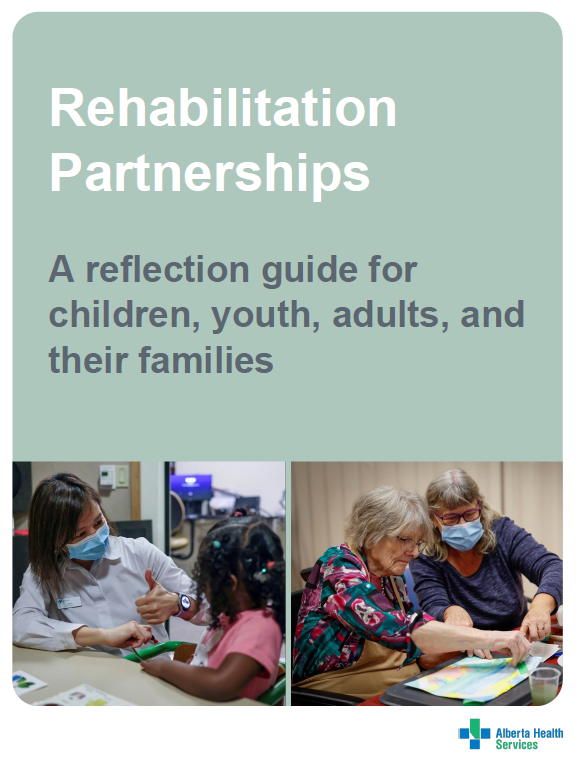Rehabilitation is a partnership.
You are the expert on your needs and experiences and your family’s needs and experiences. Rehabilitation therapists are the experts in rehabilitation. When you and your care team combine this expertise and work together, you will have a better rehabilitation experience and better treatment outcomes.
Together, you and your care team will build strong partnerships based on your unique journey, needs, and goals. To do this, your healthcare team needs to understand who you are and what matters to you.
How can I be an active partner in my rehabilitation?
Wherever you are in your rehabilitation journey, start by reflecting and asking yourself questions about your experiences so far, what matters to you and your family, and who is part of your community. This reflection will help you have meaningful, helpful conversations with your rehabilitation team.
What kinds of questions should I ask myself?
Albertans who have lived experiences with rehabilitation made a
fillable reflection guide for children, youth, adults, and their families. You can see the questions from the guide below. You can also
download and fill out the reflection guide, as some people find it helpful to write out their story and share it with new healthcare providers so that they don’t need to repeat it many times. This guide does not get added to your medical record.
There are no wrong answers to these questions, and you don’t need to share your answers with anyone unless you choose to.
You can answer these questions as a parent or family member, too. For example, instead of asking "What interests me?", you can ask yourself "What interests my child?"
-
My story
- What has my journey been like so far?
- What interests me? What do I like to do?
- What motivates me?
- How has my health condition or injury impacted my life?
-
What matters to me
- What would I like to do that I can’t do now?
- What does a typical day look like?
- What is the most difficult part of my day?
- What is important to us as a family?
-
My community
- Who is in my community that I can rely on?
- What support do I have in caring for my family members?
- Who do I go to if I need a break?
- Who can I talk to about how I am feeling?
What kinds of questions should I ask my healthcare provider?
The
reflection guide also guides you through questions to review with your healthcare provider. It can be helpful to think of these questions in 4 categories:
-
Access: How do I get rehab if I need it?
- How do I find out what rehabilitation services options are available in my community?
- How do I make an appointment for an evaluation? Is there a referral process? How does it work?
- If there are no services available in my immediate area, how do I access those services in other communities?
-
Preparation: How do I get ready for rehab?
- What can I do to prepare for my rehabilitation session?
- What are my goals for rehabilitation?
- What rehabilitation have I tried or done already?
-
Participation: How do I make the most of rehab?
- What does success look like for me?
- How will I know that I am improving?
- How often will my therapist and I talk about therapy goals?
-
Transitions: Where do I go next?
- What do I need now that my rehabilitation sessions are ending?
- What will be the next step?
- Who can I contact if I have questions after my program is completed?
What is rehabilitation?
Rehabilitation can happen in a hospital, clinic, community setting, long-term care facility, or other location. It can also happen in your home, over the phone, or virtually. Rehabilitation helps:
- support wellness and quality of life
- improve active and meaningful participation in daily living
- prevent or slow loss of function
- maintain independence
- recovery from illness, injury, or surgery
- manage long-term health conditions
Rehabilitation Partnerships

Download or print the
reflection guide for children, youth, adults, and their families (PDF) to learn more about how to be an active partner in your rehabilitation. The guide has room for you to write and reflect. It was made by Albertans who have lived experience with rehabilitation.
Reflection guide

